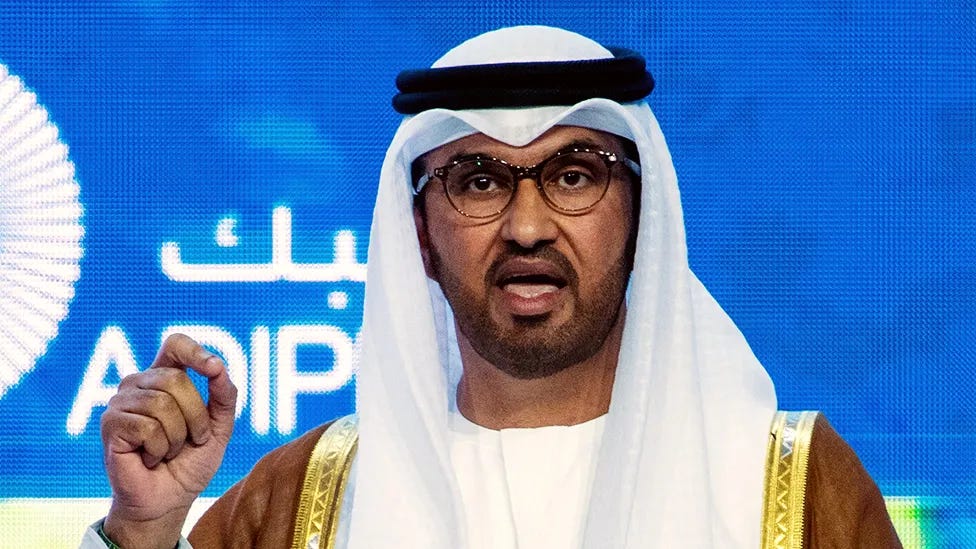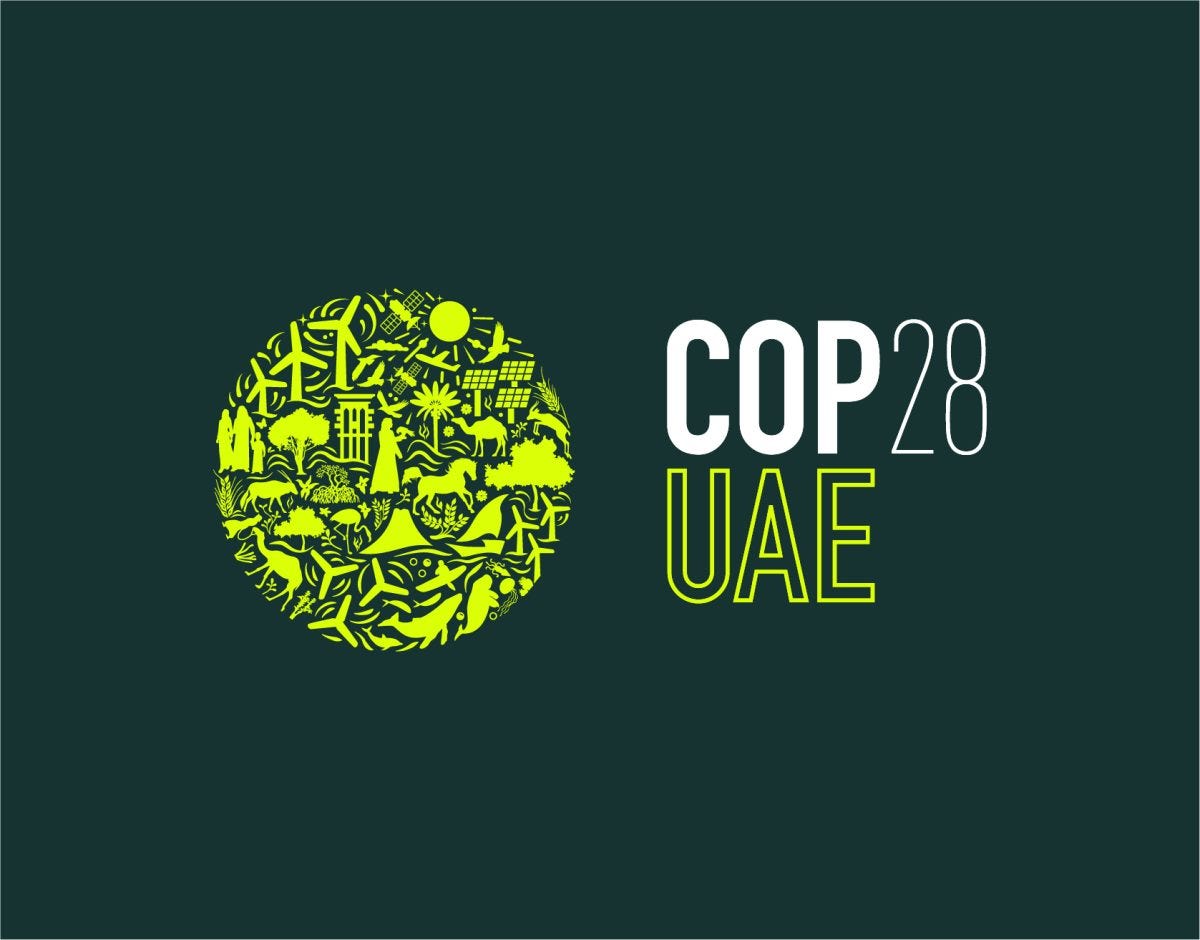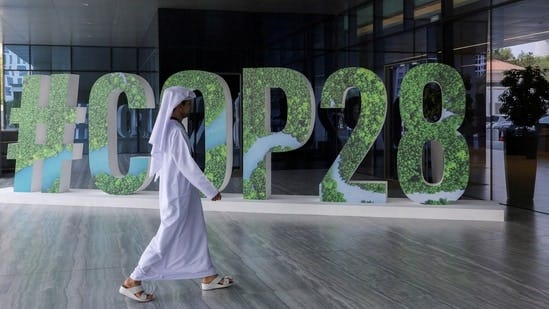Is UAE (Mis)using the COP28 Platform to Peddle Oil Deals in Dubai?
Dr Sultan al-Jaber is President of the Climate Summit and the Head of the United Arab Emirates' State Oil Company. BBC now floats a conflict-of-interest theory.

The Subtle Irony of Oil Deals at a Climate Summit
As the United Arab Emirates prepares to host the COP28 climate talks from November 30 to December 12, 2023, an ironic twist has emerged. A BBC investigative report suggests that the UAE might be using this significant environmental platform to negotiate oil and gas deals. This situation presents a paradox, given the summit's focus on reducing the impact of fossil fuels, the primary sources of greenhouse gas emissions. The UAE's dual role as a leading oil producer and the COP28 host brings into sharp relief the possible conflict between its economic interests and environmental responsibilities.
The Duality of the Host's Role
BBC investigations have pieced together evidence showing that the UAE's COP28 team arranged meetings with at least 27 foreign governments to explore fossil fuel projects, in tandem with climate action discussions. These initiatives, focused on expanding international LNG opportunities and aiding other nations in developing fossil fuel resources, contrast sharply with COP28's objective of emission reduction. Despite the UAE team emphasizing the private nature of these meetings, the confluence of the COP28 Presidency and leadership roles in national oil companies highlights the intricate balance between economic pursuits and the commitment to climate action.
The UAE's Unique Federation and its Role in COP28
The United Arab Emirates (UAE), hosting the crucial COP28, is a federation established in 1971, encompassing seven emirates, each wielding autonomy over its oil wealth. Abu Dhabi, the largest emirate with the most substantial oil reserves, plays a pivotal role in shaping the nation's economic trajectory. Intriguingly, the Ruler of Abu Dhabi holds the ex-officio position of President of the UAE, a testament to the emirate's significant influence. This federal structure, governed by the Federal Supreme Council consisting of the rulers of these emirates, strikes a delicate balance between maintaining the individuality of each emirate and fostering federal unity. As COP28's host, the UAE, stands at the crossroads of its economic interests rooted in oil and its global environmental commitments. This unique federation model provides a vital context for understanding the UAE’s multifaceted role in navigating the complexities of the COP28 climate discussions.
Focus on Core Goals: Avoid Distractions like Mahabharat’s Arjun
Amidst the unfolding narrative, members of the UAE's COP28 organizing team and representatives from the Global South have raised concerns about the timing of the BBC report. They suggest it might be a strategic diversion by wealthier, more polluting nations to shift focus away from the summit's central objectives. These include the implementation of the "Polluter Pays Principle" (PPP) at both global and local levels, and highlighting the legitimate demands of populous, developing economies like India and China for a per-capita emissions basis in determining national responsibilities. In the spirit of Arjun from the Indian Epic Mahabharat, who focused solely on the eye of the fish, it is crucial to concentrate on five key outcomes that will define COP28's success. This unwavering focus will help in objectively assessing the conference's impact and progress towards its stated goals.
Key Outcomes to Watch at COP28
a.) Assessing Global Climate Progress
The first global stocktake to assess progress towards the Paris Agreement's objectives is a central aspect of COP28. This evaluation will provide a vital reality check on the international community's efforts to limit global warming, an issue that requires urgent and escalated actions.
b.) Tackling Fossil Fuel Dependency
One of the most contentious topics at COP28 will be the phase-down of coal, oil, and gas usage. The negotiations take on additional layers of complexity against the backdrop of the host country's significant investments in these very energy sources.
c.) Public Health and Climate Change
A novel addition to the COP28 agenda is the dedicated discussion on the intersection of climate change and public health. This focus underscores the dual benefits of reducing emissions: mitigating climate change and improving global health outcomes.
d.) Emphasizing Nature-Based Solutions
The conference is expected to highlight the role of natural solutions, like forest conservation, in carbon sequestration. The effective implementation and funding of these solutions are crucial for integrating biodiversity conservation with climate mitigation strategies.
e.) Financing Climate Action
COP28 will delve into the intricacies of climate financing, particularly the "loss and damage" funding for vulnerable nations. The dialogue around financial support from developed to developing nations remains a critical and sensitive topic.
A Cautiously Optimistic Conclusion
As COP28 inches towards its inauguration, a cautiously optimistic approach is crucial. Despite the controversies preceding the conference as reported by the BBC, the true gauge of its success lies in the tangible outcomes and their impact on global climate action. It's vital to move past initial diversionary and selective reporting and focus on the potential of the conference for substantial and transformative advancements. There's an expectation that COP28 will mark a significant stride in combating climate change, despite its inherent complexities. Additionally, there is anticipation that India and China will unite to ensure fair treatment for the developing and less developed nations, preventing any agreements that could detrimentally impact the lives and livelihoods of billions in the Global South.




